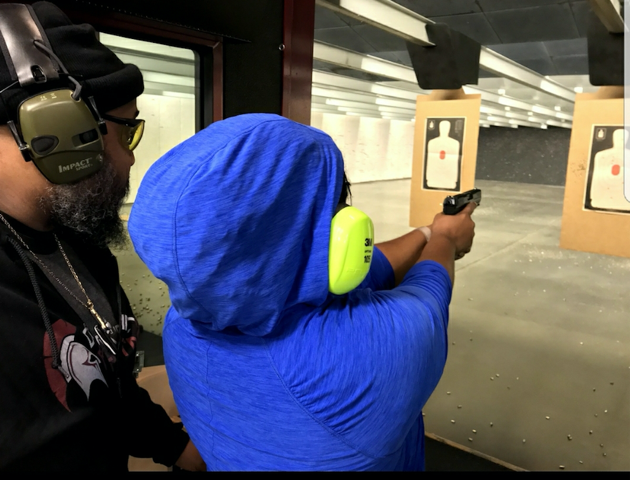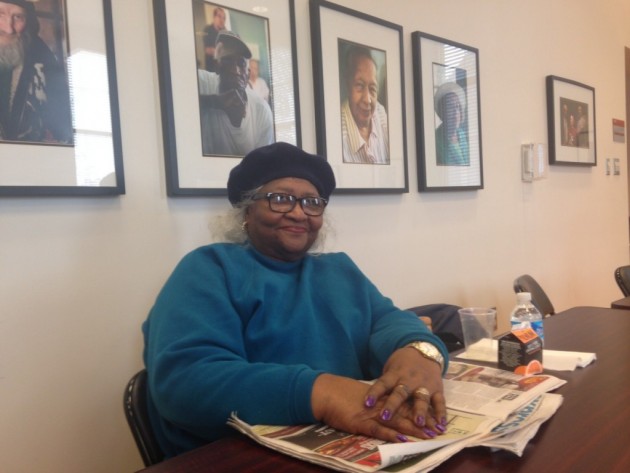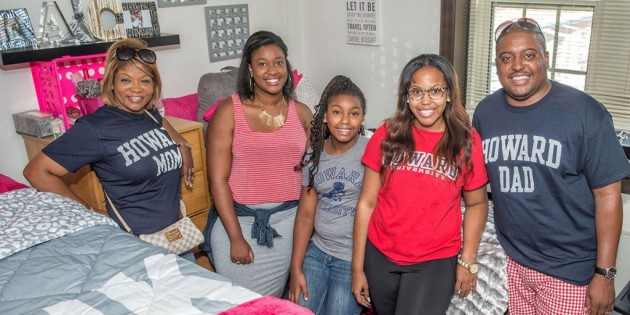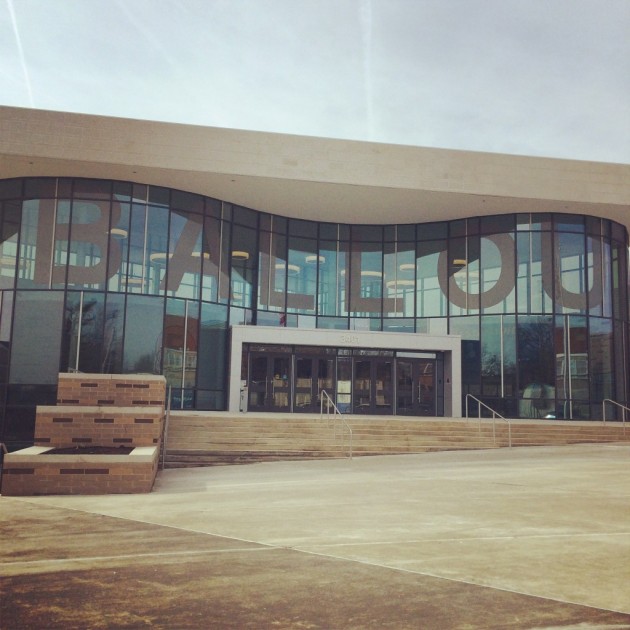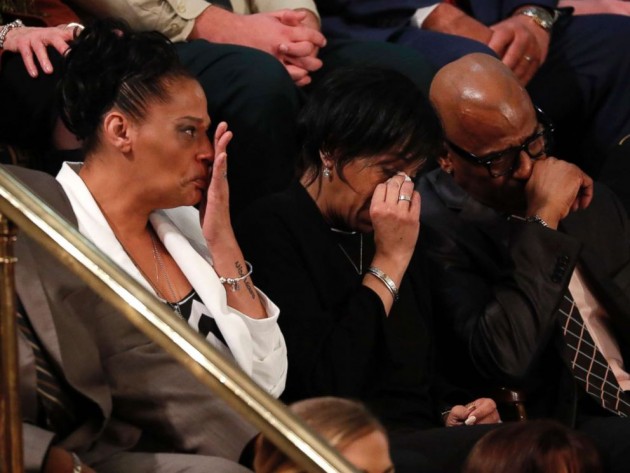
Marcus Hyman, commander of the DMV chapter of the Black Gun Owners' Association, instructs a student during one of his training sessions at Trinity Training Academy. [photo submitted by Marcus Hyman]
WASHINGTON — In the wake of the Stoneman Douglas High School shooting in Parkland, Fla., subsequent March for Our Lives in Washington and nationwide school walkouts last week to commemorate the lives lost 20 years ago in the Columbine High School shooting, debate over guns and gun ownership has heightened.
African-Americans who own guns and advocate for their right to bear arms, however, have been missing from this debate. Whites, according to a study conducted by the Pew Research Center, are more enamored with guns than African-Americans. Of those surveyed, 32 percent of black Americans have a gun in the household, compared to 49 percent of whites.
Still, while there are no official numbers, anecdotal evidence suggests that more black Americans are buying guns for self-defense, either from criminals in crime-ridden neighborhoods or white supremacists. Additionally, two national black guns owner’s organizations, both founded within the last three years, report they have grown to tens of thousands of members in just a few years.
According to an NBC News report, firearms dealers and gun clubs across the country say they have seen a sharp rise in the number of African Americans buying guns recently, many since the election of President Donald Trump. Some are walking into gun shops to arm themselves, they told NBC, out of fear that Trump’s election has emboldened white supremacists and stoked tensions between the races.
Owners of gun ranges reported first-time black gun buyers were flocking in, filling open seats in gun-safety and concealed-carry classes which usually tend to consist mostly of older white miles.
For an active duty Army master sergeant who wishes to remain anonymous, firearm ownership is a matter of responsibility and accountability. As a parent of two young children, she said, having firearms in her home is a means of protection for her, her husband and their children. In a few years, they plan to begin teaching their youngest son, age 6, how to safely handle a firearm, she said.
“I think it’s everyone’s right to own a gun if you choose, but it’s also everyone’s duty to be responsible,” she said. “Proper firearm training is very important, because you can hold them [gun owners] accountable…they’re aware of what the expectation is so they’re aware of the recourse.”
Derrick Morgan, national commander of the Black Gun Owners’ Association of America, said his organization, founded in April of 2017, has seen a substantial increase in membership following the election of Trump. Membership numbers spiked in recent weeks following the death of Stephon Clark, a 22-year-old black man killed by Sacramento, Calif., police, and the series of package bombs in Austin, Texas, that killed a number of black residents.
Morgan said his organization was formed to put black Americans “in a better position to fight as a community.” It offers memberships ranging from $40 for one year, to $140 for five years and $1000 for a lifetime membership. The organization also sells life, home, car and motorcycle insurance. Its website features photos of a person in black tactical gear holding an assault rifle.
The Black Gun Owners’ Association describes itself on its web pages as a “non-profit organization which advocates gun rights for the black community and offers supportive services for gun owners. Our organization provides legal protection for our members through alliances with attorneys who are ready to defend cases of civil rights violations.”
“We feel as though gun control is being strongly advocated right as hate crimes against us are beginning to increase,” Morgan said. “People are feeling the need to learn how to properly use a firearm to defend themselves from acts of hate and terrorism, especially from people who were otherwise against having a fire arm in the home.”
The National Association of African-American Gun Association, formed in 2015 in Atlanta, serves a similar purpose in its mission to familiarize black Americans with firearms and their uses. Its president, Phillip Smith, called gun ownership “a natural maturation process for the black community” in an interview with Maria Lloyd of the YouTube channel, “Your Black World.”
“The process of growing—to go from slavery to owning guns for self-defense to the black codes being implemented is a long and very torturous road,” Smith said, pointing to journalist Ida B. Wells and abolitionist Frederick Douglass, two famous African Americans who were known to have carried guns as a form of self-defense.
“In terms of the history of guns in African-American communities, we need to read about how we got to this point,” he said.
NAAGA’s membership demographics are majority black and female according to Smith, with both liberal and conservative members. Information about joining the organization is also completed entirely by word of mouth and through its Facebook page. Since its founding in February 2015, NAAGA has seen growth from the hundreds into the thousands. Like Morgan, Smith said he believes the desire for self-protection is the driving force behind these numbers.
On its Facebook page, NAAGA said its goals are introducing every African-American person to firearm use “for home protection, competitive shooting and outdoor recreational activities.” Information about membership is spread almost entirely via word of mouth and its corporate sponsors provide a large amount of funding for the organization so it can maintain its low membership prices. Recently Glock became the group’s official firearm.
“If you say gun in a black community, let’s face it, it’s kind of viewed in a negative manner,” he said. “You have to really clarify [by saying] ‘well, I’m not a gang banger, I’m not to the far right, I just want a gun to protect myself at home."

A student at Leon Adams' shooting range fires at a target. [photo courtesty of Leon Adams]
Leon Adams, owner of Superior Security Concepts, has been teaching firearm operation and safety through his company for more than 20 years, primarily specifically to black gun owners. He said he began after witnessing the lack of knowledge a number of black Americans in his home state of Georgia had on gun laws and policies. In Georgia, illegal use of a firearm could result in up to five years in prison according to the state’s official website.
“Most people in [black] communities take more of a shortcut as it pertains to our rights to be able to bear arms,” Adams explained, citing illegal gun ownership by many black Americans. “The foundation upon this country was built…was the right to self-defense.”
Similarly, in Virginia, Marcus Hyman, commander of the Black Gun Owners’ Association, specializes in teaching black Americans how to safely own and operate a gun. At the end of the month, he his fellow BGOA members will be hosting people from their communities in an effort to clear the stigma surrounding blacks and firearm operation.
“You have a right as a citizen [to own a gun],” Hyman explained. “You have a home, you have a family. You should have one in your home for your family, for your protection.”
Some black gun owners question if their Second Amendment right to own and carry guns is as protected as that of their white counterparts. They say even the legal possession of a firearm can be dangerous to a black person.
They cite Philando Castile, a legal gun owner who was killed by a Minnesota police officer during a routine traffic stop in 2016, and Tamir Rice, a 12-year-old who was shot by Cleveland police while playing with a toy gun that police mistakenly assumed was real (in Ohio, residents have a right to openly carry weapons and often do).
Carl Wilkins, a Vietnam War veteran and retired Washington, D.C., police officer who has owned a firearm for more than 50 years, said he has experienced the disparity repeatedly.
"The mentality is that black people are dangerous, black people are irresponsible, therefore black people shouldn’t own guns,” Wilkins said. “I have to sometimes show [gun store employees] my retired badge before they’ll even wait on me. But a 17-year-old white kid can go in there and buy a gun.”
Wilkins is a resident of Baltimore City, where gun violence has plagued the city for more than a decade. In in 2017, 88 percent of its nearly 350 homicides were gun-related, according to police data.
A study by the Johns Hopkins Center for Gun Policy and Research analyzed the use of guns in Baltimore criminal cases. Its researchers found that the passage of Maryland’s 2013 Firearms Safety Act resulted in a 70 percent decrease in guns used for criminal intent.

